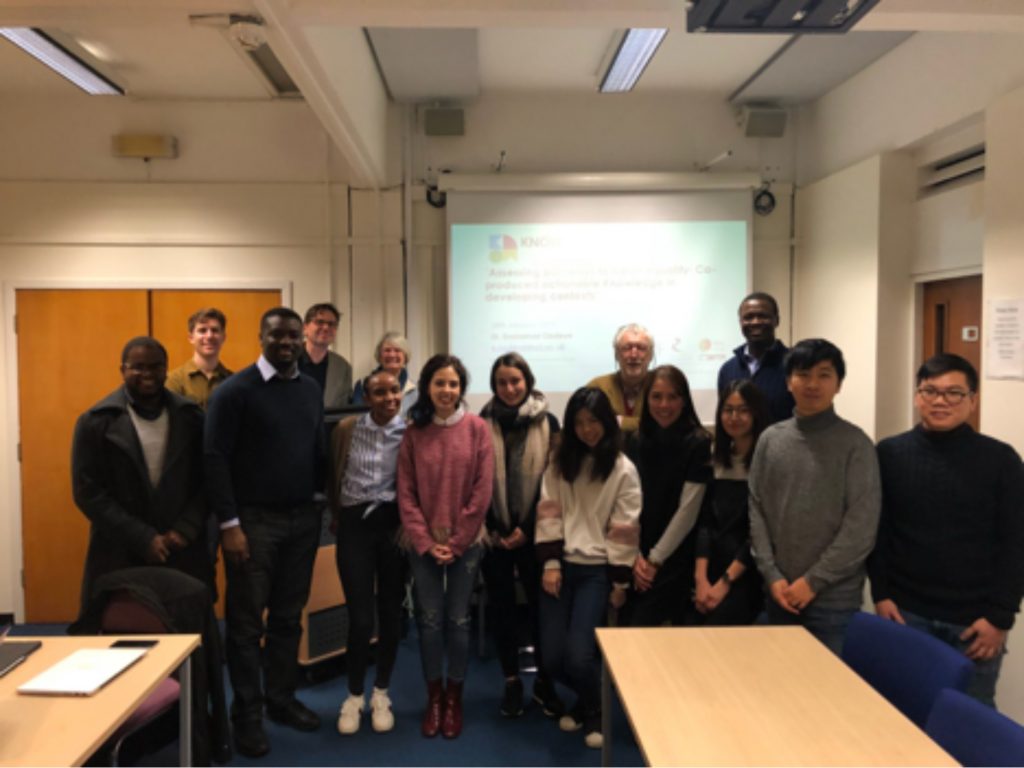Kent Law School alumnus Dr Emmanuel Osuteye returned to deliver a talk on the intersections of academic research and practical action to target areas of need as part of the Law School’s 2018/19 Environmental Law Seminars Series.
Dr Osuteye graduated from Kent with an LLM in 2009 and with a PhD in 2014. His PhD research was a systematic study of the nature of environmentalism (issues of environmental concern, effects of problems, and local responses) in Ghana, West Africa. He now works as an environmental, social and legal researcher at Universal College London (UCL). At UCL, he is focused on demonstrating how research is not confined to academic work but can also be used to assist with work in the real world. Along these lines, Dr Osuteye delivered a talk that offered a sense of the path he has taken, the work that he has done, and what life can be like after the LLM.
Dr Osuteye spoke about three research projects that he is involved with: (1) the Urban ARK, (2) AXA Community Knowledge for Policy Action and (3) Knowledge in Action for Urban Equality. In so doing, he developed the idea of co-production, in which a range of professionals and partners, rather than just academics, come together in order to bring together a range of backgrounds, identities, and experiences, in order to produce knowledge. In his own words, “Knowledge co-production goes beyond mere collaboration, and is in fact a deliberative iterative process of recognizing and promoting collective understanding, openness in engagement.”
Dr Osuteye spoke at length about the Urban ARK project, and the three core challenges for urbanisation in sub-Saharan Africa: (1) building data; (2) building understanding of urbanisation and risk relationships; and (3) building risk management capacity. From these challenges spring relevant research questions: (1) What is the nature, scale, and distribution of risk across the whole spectrum of hazards in urban centres, and what are their inter-linkages? (2) What are the underlying factors driving risk accumulation in the context of urban growth and change, poverty, and climate change? (3) What institutional arrangements in local governance and in urban planning are capable of reducing risk and building resilience in this context? From these frameworks, Dr Osuteye explained how it is possible to break cycles of risk and accumulation, and build understanding for equity and resilience in cities of sub-Saharan Africa, balanced against the rapid pace of expansion and growth in these areas.
Following the talk, there was a productive question and answer session. One insightful question concerned how Dr Osuteye developed relationships with NGOs and other local partners. He responded by noting that partnerships are built on mutual respect, the co-production of knowledge, reciprocal transparency and accountability, and co-learning. In order to avoid typical issues, his team makes efforts not to fatigue local partners by working with them at each stage of the process – they deploy their research and resources in order to improve the situation on the ground for the local community, which fosters good faith.
This month’s seminar was organised for LLM students by the student committee comprising LLM students Dauda Laingay Bangura, Julian Schneider and Siwat Pornchai.
Environmental law at Kent
Environmental law is a recognised and long-established area of teaching and research expertise at Kent Law School. Academics, including Professor William Howarth and Dr Martin Hedemann-Robinson, are engaged in research across a number of areas of environmental law, with research spanning international, European and national law and policy. The Law School’s Environmental Law Seminar Series has been designed specifically for LLM (Master’s in Law) students with an interest in the environmental law modules offered at Kent.
Kent LLM students can graduate on the International Environmental Law and Policy pathway by (i) opting to study at least three (out of six) modules from those associated with the pathway of their choice and by (ii) focusing the topic of their dissertation on their chosen pathway. Students can also study environmental law in combination with other areas offered by the Law School.
A record of previous talks held as part of the Law School Environmental Law Seminar Series is available on our news blog.

